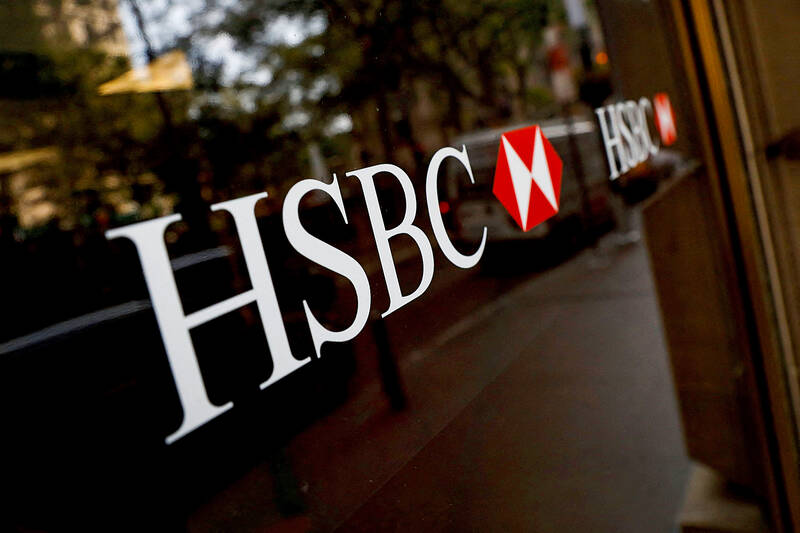Most Taiwanese entrepreneurs are upbeat about wealth growth, backed by their confidence in business opportunities, investment portfolios and personal capabilities, HSBC Taiwan said in a report released yesterday.
Ninety percent of local entrepreneurs expressed positive views, while 85 percent saw global networking as a key to business success, the banking group’s survey showed.
The survey covered 1,798 business owners across 10 global markets, including more than 140 entrepreneurs from Taiwan.

Photo: Reuters
The annual survey aims to shed light on what drives the world’s wealthiest entrepreneurs, and how they are thinking about the future of their businesses and personal wealth.
Taiwan’s entrepreneurs exhibited high mobility in yesterday’s report, with 68 percent residing in multiple locations — higher than the global average of 53 percent, it said, adding that Asia was their primary business market.
Seventeen percent voiced keen interest in expanding their business in Singapore, followed by Hong Kong and Japan at 13 percent each, it said.
Climate change was atop the list of concerns among Taiwanese entrepreneurs at 25 percent, followed by inflation at 22 percent and geopolitical tensions at 21 percent, it said.
Regarding wealth allocation, 69 percent of Taiwanese entrepreneurs mainly invested in stocks, bonds and real estate, while 51 percent preferred savings and 49 percent targeted home purchases, it said.
The report also sought to understand business succession planning worldwide.
Yesterday’s report showed that 65 percent of entrepreneurs in Taiwan had not drawn up a succession plan, with first-generation entrepreneurs being the least prepared at 78 percent.
The ratio was much higher than 59 percent in the US and 58 percent in the UK, it said.
Concerns over maintaining business continuity, finding a suitable successor and tax planning pose top challenges to succession planning, Taiwanese entrepreneurs said.
Eighty-one percent of family business successors indicated they have full trust from their family in their ability to take over and that 70 percent have family support, lower than the global average of 79 percent, the report said.
Only 65 percent of Taiwanese entrepreneurs deemed maintaining a family business as a source of pride, much lower than the global average of 80 percent, it said, adding that 30 percent of Taiwanese entrepreneurs cited upholding their family legacy as the driving force for wealth growth, higher than the global average of 21 percent.
Nearly 70 percent described having a business mentor as crucial, while 85 percent believed that global networks are essential for business success, it said.
Forty-four percent felt lonely and 36 percent found it difficult to seek advice from older family members, the report added.

Hon Hai Precision Industry Co (鴻海精密) yesterday said that its research institute has launched its first advanced artificial intelligence (AI) large language model (LLM) using traditional Chinese, with technology assistance from Nvidia Corp. Hon Hai, also known as Foxconn Technology Group (富士康科技集團), said the LLM, FoxBrain, is expected to improve its data analysis capabilities for smart manufacturing, and electric vehicle and smart city development. An LLM is a type of AI trained on vast amounts of text data and uses deep learning techniques, particularly neural networks, to process and generate language. They are essential for building and improving AI-powered servers. Nvidia provided assistance

GREAT SUCCESS: Republican Senator Todd Young expressed surprise at Trump’s comments and said he expects the administration to keep the program running US lawmakers who helped secure billions of dollars in subsidies for domestic semiconductor manufacturing rejected US President Donald Trump’s call to revoke the 2022 CHIPS and Science Act, signaling that any repeal effort in the US Congress would fall short. US Senate Minority Leader Chuck Schumer, who negotiated the law, on Wednesday said that Trump’s demand would fail, while a top Republican proponent, US Senator Todd Young, expressed surprise at the president’s comments and said he expects the administration to keep the program running. The CHIPS Act is “essential for America leading the world in tech, leading the world in AI [artificial

DOMESTIC SUPPLY: The probe comes as Donald Trump has called for the repeal of the US$52.7 billion CHIPS and Science Act, which the US Congress passed in 2022 The Office of the US Trade Representative is to hold a hearing tomorrow into older Chinese-made “legacy” semiconductors that could heap more US tariffs on chips from China that power everyday goods from cars to washing machines to telecoms equipment. The probe, which began during former US president Joe Biden’s tenure in December last year, aims to protect US and other semiconductor producers from China’s massive state-driven buildup of domestic chip supply. A 50 percent US tariff on Chinese semiconductors began on Jan. 1. Legacy chips use older manufacturing processes introduced more than a decade ago and are often far simpler than

Gasoline and diesel prices this week are to decrease NT$0.5 and NT$1 per liter respectively as international crude prices continued to fall last week, CPC Corp, Taiwan (CPC, 台灣中油) and Formosa Petrochemical Corp (台塑石化) said yesterday. Effective today, gasoline prices at CPC and Formosa stations are to decrease to NT$29.2, NT$30.7 and NT$32.7 per liter for 92, 95 and 98-octane unleaded gasoline respectively, while premium diesel is to cost NT$27.9 per liter at CPC stations and NT$27.7 at Formosa pumps, the companies said in separate statements. Global crude oil prices dropped last week after the eight OPEC+ members said they would